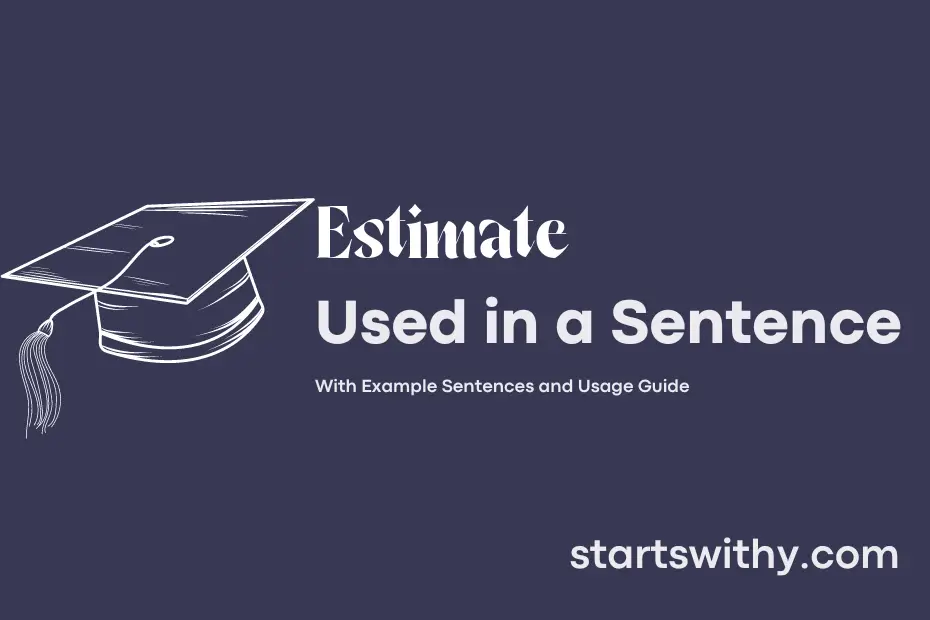Have you ever wondered how to use the word “estimate” correctly in a sentence? An estimate is a rough calculation or approximation of the value, number, quantity, or extent of something.
When crafting a sentence with “estimate,” it is important to consider the context in which the word is being used to convey the intended meaning accurately.
7 Examples Of Estimate Used In a Sentence For Kids
- The teacher asked us to estimate how many pencils were in the jar.
- I tried to estimate how many balloons were in the room.
- My mom asked me to estimate how many cookies were left in the jar.
- We need to estimate how many toys are in the box.
- Can you estimate how many flowers are in the garden?
- Let’s estimate how many apples are in the basket.
- The game is to estimate how many blocks are in the tower.
14 Sentences with Estimate Examples
- Estimate how much time it will take to complete your assignment so you can plan your schedule accordingly.
- Make sure to estimate your expenses before going shopping for groceries to stay within your budget.
- It’s important to estimate the number of study hours needed for each subject to prepare for exams effectively.
- When planning a group project, collaborate with your team to estimate the workload and divide tasks accordingly.
- Before choosing a college for further studies, estimate the tuition fees and other expenses to make an informed decision.
- Attend career fairs and workshops to estimate the job market demand and opportunities in your field of study.
- Estimate the amount of study material you need to cover every week to stay on track with your syllabus.
- Use online resources to estimate the cost of living in different cities if you’re considering moving for higher studies.
- Estimate the number of credits you need to graduate and plan your course selection accordingly.
- Create a monthly budget by estimating your income and expenses to manage your finances effectively as a student.
- Participate in mock interviews to estimate your preparedness for job interviews and improve your communication skills.
- Estimate the time needed to commute between classes to avoid being late for lectures or exams.
- Utilize apps or tools to estimate the amount of sleep you need each night to maintain a healthy work-study-life balance.
- Seek feedback from professors to estimate your progress and identify areas where you can improve your academic performance.
How To Use Estimate in Sentences?
Estimate means to roughly calculate or guess the value, extent, or size of something based on limited information. When using the word estimate in a sentence, follow these steps:
-
Identify the context: Determine what you are estimating. It could be a number, value, distance, time, or any other measurable quantity.
-
Use the word estimate in a sentence: Place the word estimate in a sentence where you are providing a rough calculation or guess based on the information available.
-
Provide additional information: Include relevant details about how you arrived at the estimated value. This could involve explaining the assumptions made or the data used for the estimation.
For example, “I estimated that there are about 100 people in the room based on the number of chairs.” In this sentence, the word estimate is used to indicate a rough calculation of the number of people in the room, with the reasoning behind the estimation being the number of chairs present.
Remember to use the word estimate when you are making an educated guess or approximate calculation, rather than providing an exact figure. This helps to convey that the value stated is not precise but rather a rough approximation.
Conclusion
In conclusion, estimates are approximations or educated guesses about quantity, value, or extent. They are used in various fields such as finance, construction, and data analysis to plan, budget, and make informed decisions. For instance, a project manager might create estimates for the cost and duration of a construction project before starting work.
Having accurate estimates is crucial for efficient resource allocation and successful project management. Uncertainty and errors in estimates can lead to delays, cost overruns, or even project failure. Therefore, it is important to carefully gather data, consider various factors, and use appropriate methods to create reliable estimates that can guide decision-making and ensure the smooth execution of tasks.



